Biden's Pledge Of Support Reassures Syria's Embattled Kurds
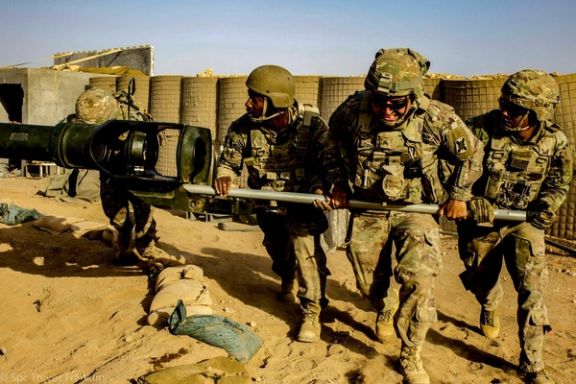
A recent pledge by US president Joe Biden that the US would not abandon Kurdish allies in Syria has gone a long way to allay their fears, according to Reuters.

A recent pledge by US president Joe Biden that the US would not abandon Kurdish allies in Syria has gone a long way to allay their fears, according to Reuters.
In meetings held in August and September between US officials and the Kurdish-led Syrian Democratic Forces (SDF), Biden’s pledge was conveyed to the Kurds who have played a pivotal role in the fight against the Islamic State group. They are supported by around 2,000 US troops stationed in Syria.
The US military presence in Syria is also needed to curb Iran’s influence in both Iraq and Syria and address the security concerns many US allies – particularly Israel – in the region feel as a result.
The hasty and badly organized US withdrawal from Afghanistan in August prompted fears among Washington’s other allies about the durability of US friendship. Kurdish troops in northeastern Syria, facing multi-pronged opposition from Islamic State fighters as well as the Assad regime and the prospect of Turkish incursion, have felt particularly vulnerable.
The election of Joe Biden in November 2020 raised the hopes that the US would adopt a steadier approach in its dealings with the Kurds in Syria. And it seems that, on appearances at least, the US is willing to do so.
Reporting by Reuters
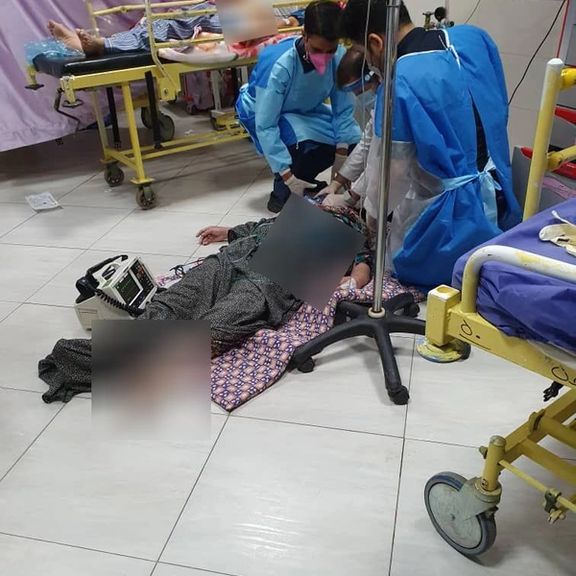
Iran’s Supreme Leader Ali Khamenei’s personal physician Alireza Marandi has told the health minister criticizing plans to hold a “vaccine victory” celebration.
Marandi, who is also Khamenei's medical advisor, in a letter to the health minister has warned that such a mentality "oversimplifies" the Covid-19 pandemic.
Iran’s Supreme Leader Ali Khamenei’s personal physician and medical advisor Alireza Marandi has written to the health minister criticizing plans to hold a “vaccine victory” celebration, saying such a move is oversimplifying the health crisis.
Health Minister Bahram Einollahi said earlier this week that the country would hold celebrations to mark “vaccine victory”. Iran started Covid-19 vaccination late and stayed behind many other regional countries such as Turkey, the United Arab Emirates and Saudi Arabia.
As a severe new wave of infections and deaths hit the country in July and August, imports of Chinese vaccines picked up speed and more than 55 million doses have been administered among Iran’s 85-million population.
However, the main reason for the slow start to vaccination was Khamenei’s ban in January to import American and British vaccines, largely on political grounds and based on conspiracy theories. The leader’s personal doctor was among those who early on backed the vaccine ban.
Marandi has told the health minister that premature celebrations can lead to loss of trust among the populace regarding government decisions and actions.
Iran has so far fully vaccinated around 30 percent of its population, although political leaders try to claim that close to 70 percent are vaccinated, by counting those who have received only the first dose.
More than 120,000 Iranians have died according to official government figures that are hotly contested by medical experts and some politicians in the country. There have been estimates that the real figure might be 2-3 times higher that what the health ministry says.
Marandi in his letter has warned the health minister not to make optimistic promises of freedom to travel once vaccination reaches 70 percent. He said such moves could lead to new pandemic surges, taking more lives.
The change in tone of Khamenei’s personal doctor could signal the possibility that Supreme Leader learned a lesson from underestimating the pandemic earlier on and besides his vaccine ban, allowing crowded religious ceremonies to take place.
Another major mistake by Khamenei’s office was to promise the development of homegrown vaccines, despite warnings that this would be a very ambitious undertaking.
According to some claims, the government gave hundreds of millions of dollars to powerful regime insiders to develop half a dozen Covid vaccines, and so all these efforts have essentially failed. This has led to public criticism and even ridicule, a fact implicitly reflected in Marandi’s letter.
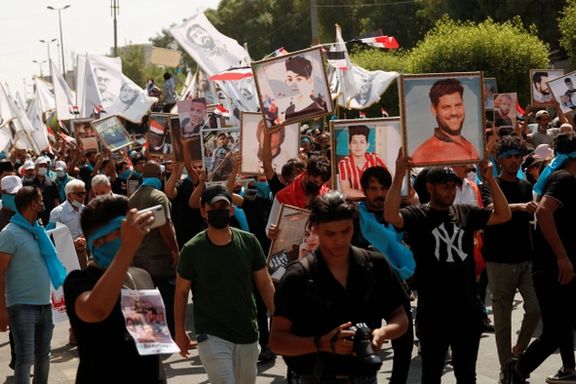
Iraqis marched in Baghdad Friday to mark two years since mass anti-government protests erupted in the Iraqi capital and southern provinces calling for reform.
Around 1,000 protesters took part in the event in the center of Baghdad, many of them carrying photos of loved ones who were killed by security forces during the protests.
The commemoration comes a week before Iraq plans to hold early elections, which had been a key demand of tens of thousands of protesters who thronged streets and public squares in October 2019 until early 2020.
Demonstrators camped out in the capital's Tahrir Square for months, most of them Iraqi youth decrying endemic corruption, poor services and unemployment.
The movement petered out owing to the government's heavy-handed response and the coronavirus pandemic.
Over 600 people died as security forces used live ammunition and tear gas canisters to disperse crowds.
Now, many among the protest movement are calling for a boycott of the elections scheduled for October 10, convinced that nothing will change.
They decry in particular a string of targeted assassinations against civil society groups and outspoken activists for which no one has been held accountable.
The killings have created a climate of fear and widespread reluctance to take part in the voting, particularly among young Iraqis who constitute the largest group of voters in Iraq.
Reporting by AP
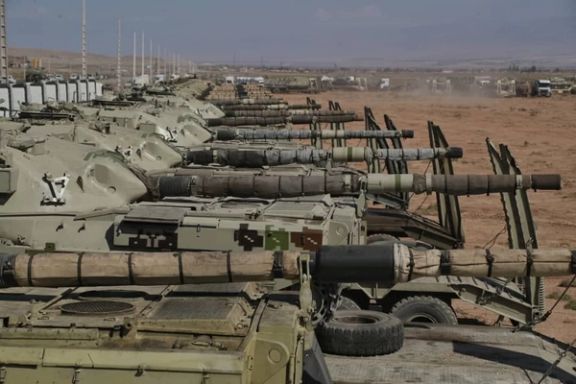
The commander of the Iranian army's ground forces says the Islamic Republic will not tolerate any change in the official borders close to the Iranian territory.
Brigadier General Kiumars Heidari’s remarks in an interview with the official news agency IRNA, came as a major Iranian military exercise started along Iran's borders with the Republic of Azerbaijan on Friday and videos and photos posted on social media show massive deployment of Iranian forces and military equipment to the region.
Heidari said: "There are unwanted elements in our region who wish to destabilize the region and undermine its security." He added: "We have been more sensitive about developments at our borders since Israeli elements have arrived in our region. We are monitoring their activity."
Last year when the war over Nagorno Karabakh took place between Azerbaijan and Armenia, Iranian officials and military commanders said that there were Israeli elements in the region and that Azerbaijan and Turkey had positioned Syrian jihadist militia in an area close to Iranian borders.
The Iranian commander reiterated, "We have still not been convinced that the terrorists who have come to the region from Syria have left this region," while also insisting that "Iran is sensitive to changes to official borders in its vicinity and cannot accept them."
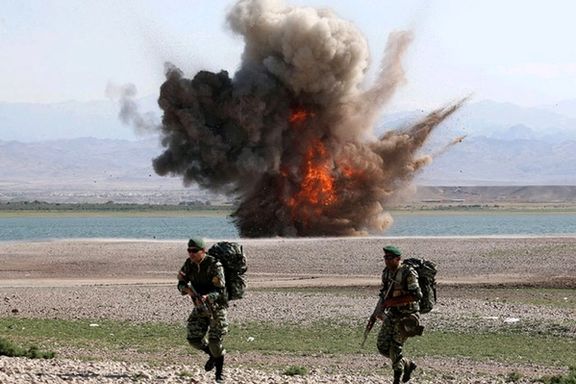
In a clear reference to Armenia, which was defeated in the 2020 war, Heidari said, "A possible weakness in one country to protect its borders gives no reason to other countries to change the borders. The Islamic Republic will not allow that.” There have been recent signs of Azerbaijan flexing its muscle in the narrow strip of Armenia’s southern province that connects Iran with Armenia, Georgia and beyond to the north.
General Heidari further said that the Iranian military exercise "aims to assess and promote the combat readiness of Iranian forces as there are several other military exercises going on in our neighborhood." He added: "There have been four or five exercises north of our borders during the past month and currently Turkey is also carrying out another military drill near our northern borders."
Heidari, however, insisted that Iran has never attacked any country during the past two centuries, and that Iran has stressed on Azerbaijan's territorial integrity while Karabakh was under Armenian occupation.
He insisted that transit journeys in the region should remain safe and secure and the transit routes for trade and energy transfer should be respected by regional countries. He was obviously alluding to the obstruction o Iranian trackers transit journey by Azerbaijan during the past months.
In the meantime, exchanges between social media users from Iran and Azerbaijan have continued during the past 24 hours. A tweet asking Iranian Twitter users whether they would go to war with Azerbaijan if such a war breaks out was "liked" by nearly 600 users, retweeted around 20 times and some 200 users responded that they would go to war with Azerbaijan within a few hours of posting the tweet.
Twitter account Azariha quoted Azbarjani lawmaker Fazil Aghamali as having said that Azerbaijan is capable of responding to a possible Iranian attack. The account answered that it appears that the Azeris have forgotten that the Iranian exercise started as a reaction to a trilateral exercise by Azerbaijan, Turkey and Pakistan in the region and that the Republic of Azerbaijan has violated the Caspian legal regime by extending that exercise into the Caspian Sea.
On September 30, the Twitter account Chamroush posted a video showing Iranian forces rehearsing part of the military exercise by shelling hills at the border area.
Meanwhile, Iranian lawmakers also responded to threats from Azerbaijan on Twitter. Jalal Rashidi Koochi, an MP for Marvadasht and Pasargadae wrote: "There is a limit to Iran's patience. Every bullet shot at Iran will be responded to by firing a missile at those who shoot the bullet as well as other missiles fired at Haifa, Tel Aviv and other Israeli cities."
Mohsen Dehnavi, MP for Tehran wrote in a tweet: "America and Israel have pushed Azeri leader Elham Aliyev into a dangerous scenario in order to create geopolitical changes against Iran and Russia. The heart of 6 million Shiites in the Republic of Azerbaijan pounds for Iran!"
In the Iranian press last week, the only anti-Azeri comment was observed in the Kayhan daily, close to the office of Supreme Leader Ali Khamenei. Kayhan wrote: "Iran will not tolerate changes at its northern borders which are aimed at undermining the interests of Iran and Russia." While pointing the sharp end of its analysis on the Republic of Azerbaijan, Kayhan also attacked Armenia and accused President Nikol Pashinyan of an act of reason against Armenia by accepting a Turkish-US plot."
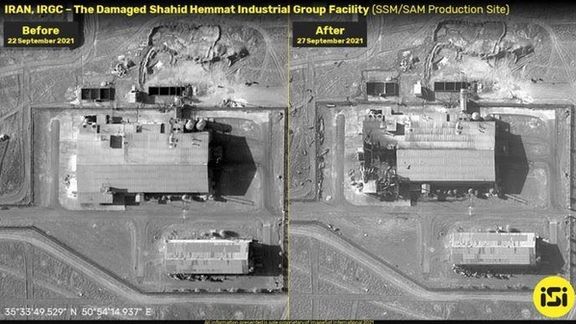
ImageSat International Thursday released images of what it said was an Iranian missile factory west of Tehran where a fire killed two workers earlier this week.
In tweets Thursday, the Tel-Aviv-based company claimed an explosion had occurred at the facility of the Shahid Hemmat Industrial Group. Two satellite images dated 22 and 27 September showed extensive damage to a building in the complex.
The Shahid Hemmat Industrial Group (SHIG) is the part of Iran's Aerospace Industries Organization (AIO) responsible for Iran's liquid-fueled ballistic missile program, including the medium-range Shahab-3.
Iran’s Revolutionary Guards (IRGC) media relations announced Sunday that firefighters had put out a blaze at a research center in western Tehran, but that two employees had lost their lives and two others had been injured. Two news agencies, Fars and Tasnim, both IRGC-affiliated, initially reported that a fire had broken out at a “self-reliance research center” but later amended to say the fire had occurred in a depot.
The Research and Self-Sufficiency Jihad Organization, to which the news agencies appeared to refer, is responsible for ballistic missile research and development.
A senior US official recently suggested Iran’s missile defense should be included in the Vienna talks aimed at reviving Iran’s 2015 nuclear agreement with world powers, the JCPOA (Joint Comprehensive Plan of Action). Tehran has insisted that the talks retain the original JCPOA focus, and has ruled out unilateral concessions over missiles outside wider regional security talks.
Since July 2020, Iran’s nuclear, military and industrial sites have all faced attacks and sabotage widely attributed to Israel, which has vowed to prevent Iran from developing nuclear weapons and threaten its territory with missiles. Israel is also skeptical about Western attempts to revive the 2015 nuclear agreement, JCPOA, with Iran, which it believes was inadequate to stop Tehran from acquiring nuclear weapons once its restrictions expired.
The Natanz uranium enrichment facility was attacked twice, in July 2020 and April 2021. Last November, Mohsen Fakhrizadeh was the latest Iranian scientist to be killed, by what was possibly a remote-controlled, heavy machine gun.
On November 12, 2011 an explosion at an IRGC missile base in Bidganeh (also Bid Kaneh) 50km west of Tehran killed at least 27 people including Brigadier-General Hassan Tehrani Moghadam. The explosion, felt and heard in some areas of Tehran, was attributed to ammunition transfer.
Questioned in 2011 over Israeli involvement in the blast, Defense Minister Ehud Barak expressed a wish that “there be more like it.” Satellite images showed extensive damage to most buildings on the site.
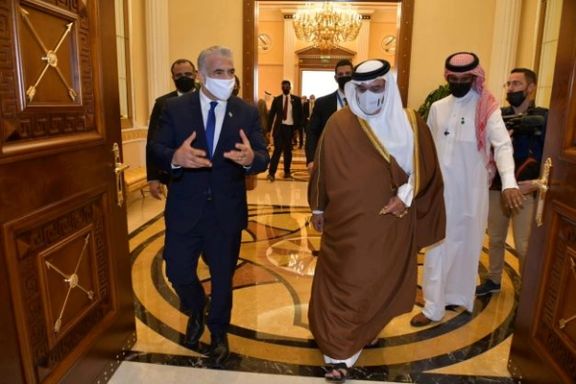
Iran said on Friday that a visit by Israel's foreign minister to Bahrain this week "left a stain" on the Gulf Arab state's rulers that "will not be erased".
Bahrain and Gulf neighbor United Arab Emirates normalized ties with Israel last year in a US-brokered deal known as the Abraham Accords that built on common commercial interests and worries about Iran.
Israeli Foreign Minister Yair Lapid, in a historic visit to strengthen normalization, met Bahraini King Hamad bin Isa Al Khalifa and Crown Prince and Prime Minister Salman bin Hamad Al Khalifa on Thursday. To signal cause against Iran, Lapid toured Bahrain's headquarters of the US Navy's Fifth Fleet, which has faced off with Iranian vessels in recent years.
“We condemn any scheme that bolsters Israel’s destructive presence in the region,” Iranian Foreign Ministry spokesman Saeed Khatibzadeh said in a statement carried by the official IRNA news agency.
“It is unfortunate that Bahrain’s rulers ignore the Zionist regime’s daily crimes against the oppressed but resilient people of Palestine,” Khatibzadeh said, referring to Israel.
“This stain will not be erased from the reputation of Bahrain’s rulers. The people of the region will continue to oppose the process of normalization of ties with the Zionist regime.”
Bahrain, a Sunni Muslim-ruled kingdom, accuses Iran of stoking unrest in Bahrain, a charge that Shi'ite Muslim Tehran denies. The island state, which quashed an uprising led mostly by Shi'ite members of its population in 2011, saw some sporadic acts of protest after the Abraham Accords were signed.
Reporting by Reuters